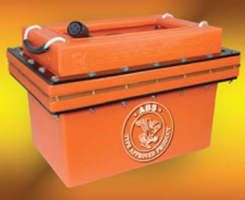Advances in Pressure Compensated Lead-Acid Batteries
By Kevin Hardy, John Sanderson, Pedram Pebdani, Binh Pham, DeepSea Power & Light
Presented at Underwater Intervention, 2010

Pressure compensation means pressure in all interior voids is equal to the ambient external pressure. This is achieved by filling the interior air space of a battery above the plates and electrolyte with an inert fluid, often white mineral oil, with enough excess volume to compensate for effects of temperature contraction and pressure compression. This paper is focused on advancements in the venerable lead-acid battery. The use of other chemistries such as Silver-Zinc and Lithium-Ion, are covered by other authors in great detail in other papers.
Read the rest at
Advances in Pressure Compensated Lead-Acid Batteries, Underwater Intervention 2010















